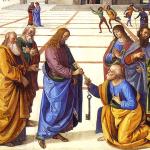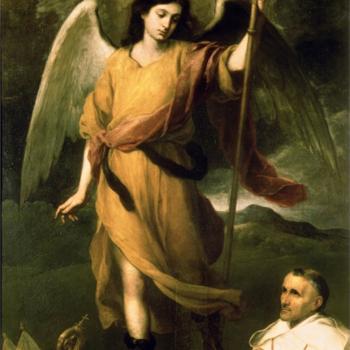“Please Hit ‘Subscribe’”! If you have received benefit from this or any of my other 4,600+ articles, please follow this blog by signing up (with your email address) on the sidebar to the right (you may have to scroll down a bit), above where there is an icon bar, “Sign Me Up!”: to receive notice when I post a new blog article. This is the equivalent of subscribing to a YouTube channel. Please also consider following me on Twitter / X and purchasing one or more of my 55 books. All of this helps me get more exposure, and (however little!) more income for my full-time apologetics work. Thanks so much and happy reading!
***
Johann Eck (1486-1543) was a German Catholic theologian, who was arguably one of Martin Luther’s two most important and formidable debate opponents, along with Erasmus (I’ve compiled several of his devastating replies to Luther as well). He was ordained as a priest in 1508 and in 1510 was installed as a professor of theology at the University of Ingolstadt in Bavaria: which lasted for thirty years. He mastered both Greek and Hebrew and had a prodigious memory, boundless energy, and very considerable debating skills. He famously engaged Luther for eighteen days in the Leipzig Disputation of July 1519.
Eck’s argumentation might be said to be one of the quintessential examples of the Catholic theological and polemical response to the Protestant Revolt up to the opening of the Council of Trent in 1545. This is one of many excerpts from his best-known and principal volume, Enchiridion of Commonplaces Against Luther and Other Enemies of the Church. It first appeared in 1529 and eventually went through 91 editions. I will be using a later edition from 1541 (translated by Ford Lewis Battles, Grand Rapids, Michigan: Baker Book House, 1979; now in the public domain).
Eck’s words will be in black; my interjections in blue, and citations from Luther and other famous Protestants in green. I use RSV for scriptural citations.
***
Axiom 1: That the heretics wish to receive nothing unless it be expressly proved through the Scriptures. . . .
Augustine to the Priest Casulanus: “In those matters concerning which divine Scripture has established nothing certain, the custom of the people of God and the regulations of the fathers are to be considered as law; and just as the transgressors of the divine laws, so also the despisers of church customs, are to be restrained.” He writes in the same vein to the Grammarian Cresconius.
Not only are those things expressly stated in the Scriptures or proved from them to be believed and kept (something the Lutherans are unwilling to do), but also it is necessary to believe and keep those things Holy Mother Church believes and observes. For not everything has been clearly handed down in the Sacred Scriptures, but very many have been left to the Church to determine (which is illumined and governed by the Holy Spirit, and on this account cannot wander from the path of truth). Hence the Savior said to his disciples [Jn 16:12f ]: “I have yet many things to say to you: but you cannot bear them now. But when he, the Spirit of truth, is come, he will teach you all truth.” Therefore the Church observes in its rites and ceremonies many things, from the intimate inspiration of the Holy Spirit, and the tradition of the Apostles, and of the holy fathers, which even if not expressly stated in the Scriptures, yet it is wicked to depart from them or take exception to them. Indeed these things are most confirmed to them, and on that account are to be enforced and observed by all true evangelical and Pauline Christians (such do the Lutherans falsely boast themselves to be). “Therefore, brethren, stand fast; and hold the traditions which you have learned, whether by word, or by our epistle” [2 Thess 2:14].
“The rest I shall dispose of when I come.” [1 Cor 11:34]. Here, speaking of the Sacred Eucharist, he makes clear that he did not write down everything, but when he comes to them, he is going to set forth the remaining unwritten things.
“Having more things to write to you, I would not by paper and ink, for I hope that I shall be with you, and speak face to face, that your joy may be full” [2 Jn v. 12]
“I had many things to write to you, but I would not by ink and pen write to you. But I hope speedily to see you and we will speak mouth to mouth” [3 Jn v. 13f].
Obviously many things both of the Lord’s words and his deeds we find omitted by the Evangelists which one reads that the Apostles either supplied by word or expressed by deed, for Paul says so in Acts 20:35: “We ought to remember the word of the Lord Jesus, how he said: It is a more blessed thing to give, rather than to receive” [Acts 20:35]. These words none of the four Evangelists has written down. Also no one expressed anything about the appearance to more than 500 brothers at the same time [1 Cor 15:6], which Paul describes.
Axiom 2: The Lutherans contend that the Scriptures are clear.
Therefore laymen and crazy old women treat them in a domineering manner.
Peter contradicts this, speaking concerning the Epistle of Paul. “In them are some things difficult to understand, which untutored and unstable men distort, as for example some scriptures, to their own destruction” [2 Pt 3:15f]. Note the difficulty of those scriptures, and how (when Paul was living) they were distorted, just as the Lutherans do today.
Jerome to Algasia: “The whole letter of Paul to the Romans is wrapped in too great obscurities.”
Axiom 3: Heretics evilly reject any other judge than Scripture.
In the Old Testament not the law but the high priest was judge. “If … a hard and doubtful matter …” [Dt 17:8]. . . . “When there shall be a controversy, (the priests) shall stand in my judgment, and judge. . .” [Ez 44:24]. And the Catholics also especially admit Scripture, but we differ from the heretics in our understanding of it; accordingly it is necessary for there to be another judge than Scripture, namely, the Church. By this example, taken from the modern heretics (who reject any other judge than Scripture) is shown how the Lutherans and Oecolampadians and Zwinglians contend over the sacrament of the Eucharist, as to whether here is truly and spiritually the body and blood of Christ, or only a figure and sign. Who among them will be judge? Who will ever bring them into harmony? Scripture or Church?
Apart from these no other judge can be provided. It is not indeed upon Scripture (which each contends to be the judge) that they lay their foundation—all the while in the self-same words of Scripture—and thus they do not admit Scripture as judge against their own doctrine, but make themselves judges over Scripture. Accordingly the Church will be the necessary judge, which believes that, when bread and wine have, by the power of Christ’s words, been transubstantiated in this sacrament, they are the true body and blood of Christ, under the species of bread and wine. . . .
Even the devil quoted Scripture against Christ [Mt 4:6]: “That he has given his angels charge over you” etc. , but a true understanding he did not possess, as Jerome concludes in Against the Luciferlans, and the Scriptures consist not in reading as the untutored crowd of the Lutheran heresy now suppose, but in understanding. Jerome, Ibid. Therefore Tertullian powerfully demonstrates in his book, On the Prescription of Heretics: it is wicked for them to be admitted to undertake the citation of the Scriptures. All heretics fled to Scriptures ill understood by them.
Augustine: Arius quotes 42 passages of Scripture in his own support.
***
*
Practical Matters: Perhaps some of my 4,600+ free online articles (the most comprehensive “one-stop” Catholic apologetics site) or fifty-five books have helped you (by God’s grace) to decide to become Catholic or to return to the Church, or better understand some doctrines and why we believe them.
Or you may believe my work is worthy to support for the purpose of apologetics and evangelism in general. If so, please seriously consider a much-needed financial contribution. I’m always in need of more funds: especially monthly support. “The laborer is worthy of his wages” (1 Tim 5:18, NKJV). 1 December 2021 was my 20th anniversary as a full-time Catholic apologist, and February 2022 marked the 25th anniversary of my blog.
PayPal donations are the easiest: just send to my email address: [email protected]. Here’s also a second page to get to PayPal. You’ll see the term “Catholic Used Book Service”, which is my old side-business. To learn about the different methods of contributing (including Zelle), see my page: About Catholic Apologist Dave Armstrong / Donation Information. Thanks a million from the bottom of my heart!
*
***
*
Photo credit: [Pixabay / CC0 public domain]
Summary: One of a series of posts documenting the Catholic apologetics efforts of Johann Eck (1486-1543) against various Protestants. This entry addresses sola Scriptura.














